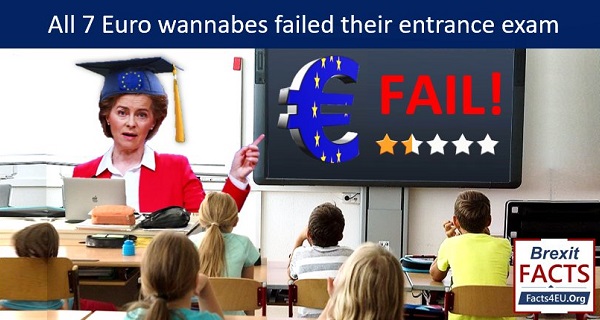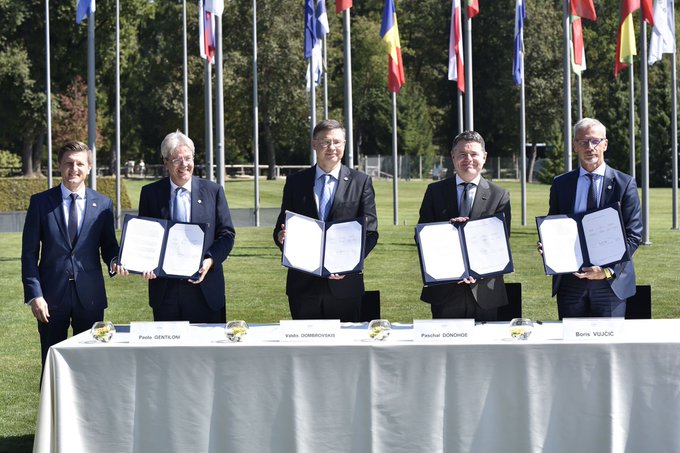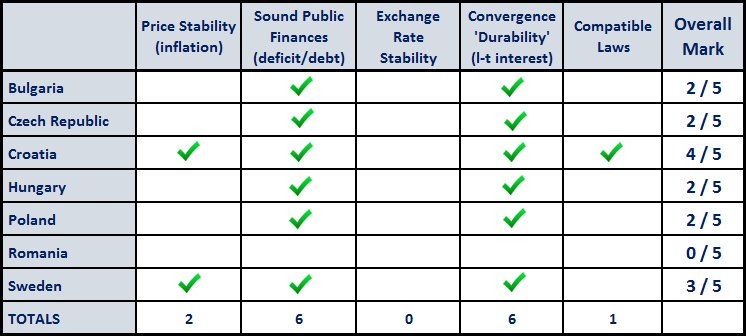Anyone want a Euro? Almost none of the seven non-Euro EU members seem to
“Sorry Teacher” - All seven Euro candidate countries failed their last entrance exam

Montage © Brexit Facts4EU.Org 2021
Most candidate countries received marks of 40% or less, one of the seven got 0%
On Saturday the EU's finance ministers convened in Brdo, Slovenia, for one of their regular meetings. Present were those representing the 19 EU countries which use the Euro as their currency, and the seven EU countries which are supposed to, but do not. (Denmark was also there, but they have a euro opt-out.)
Once again it seems that none of them could agree on EU-wide policies to tackle the EU27's growing debt and deficit problems, nor to come any closer to full monetary and fiscal union for the empire.
Indeed the EU Executive Vice-President's official closing statement was so short that the EU Commission press office was forced to use double line spacing, to make the statement look longer than it actually was.

Valdis Dombrovskis is an EU Commissioner. He is also EU Executive Vice-President for ‘an Economy that Works for People’. In his post-conference statement on Saturday he said:
“All EU countries will return to their 2019 GDP levels this year or next. And the economic differences between them were not as great as initially thought.”
Mr Dombrovskis is a Latvian politician. He's the EU Commissioner for the EU's economy. He has no commercial experience. This is normal in the EU Commission.
22 years after the EU's common currency was launched, it still isn't common
The Euro was launched on 01 January 1999, although euro coins and banknotes did not enter into circulation for another three years. 19 EU countries joined. A further seven of the EU's member countries are legally required to join the euro, but show no signs of doing so.
Facts4EU.Org has analysed the EU Commission's "2020 Euro Convergence Report" in which it provides its two-yearly assessment of the progress non-euro area Member States have made towards adopting the euro. Sweden and all other non-euro EU member states failed their latest exam.
EXCLUSIVE : Brexit Facts4EU.Org’s analysis and table shows just how bad things are
The EU's report does NOT start well for the EU. It’s opening sentence is:
“The euro is MEANT to be the single currency of the European Union as a whole.”
(Our emphasis)
NOTE: All criteria relate to the two year period 2018-2019, so COVID-19 can not be blamed
The report covers the seven non-euro area Member States which are legally committed to adopting the euro: Bulgaria, Czech Republic, Croatia, Hungary, Poland, Romania and Sweden. The Maastricht Treaty of 1992 gave euro opt-outs to the United Kingdom and to Denmark.
The EU’s report is based on the convergence criteria, sometimes referred to as the ‘Maastricht criteria', set out in article 140(1) of the Treaty on the Functioning of the European Union. The criteria include price stability, sound public finances, exchange rate stability and convergence in long-term interest rates. The compatibility of national legislation with the rules of the Economic and Monetary Union is also tested.
Brexit Facts4EU.Org Summary
All seven non-Euro EU countries fail their Euro entrance exam - yet again
- Candidate countries are marked in five subjects
- They must pass in all five, and are under a legal obligation to do so
- Not one country passed in all five subjects
- One country (Romania) failed every exam
- Even rich and successful Sweden only got a 60% average
© Brexit Facts4EU.Org 2021 - click to enlarge
The EU Commission put a brave face on the results
The EU Commission was also forced to admit that in addition to the main criteria, some of the countries :
“show macroeconomic vulnerabilities and/or face challenges related to their business environment and institutional framework.”
Euro's next victim is likely to be Croatia
The next most likely country to join the euro currency is Croatia. On Friday last week the EU signed a 'Memorandum of Understanding' which allows Croatia to start test-minting euro coins. The earliest that Croatia could join is 01 Jan 2023 and this would only happen if it meets all of the criteria.
"The Commission continues to support Croatia in its efforts to join the euro area, from which it stands to benefit greatly. However, before it can adopt Europe's single currency, Croatia must first meet all Maastricht criteria and continue to make progress on technical preparations.”
- Valdis Dombrovskis, EU Executive Vice-President, 10 Sep 2021

To put Croatia into context for British readers:
United Kingdom's GDP 2020: $2,708bn. Croatia's GDP 2020: $56bn Last year the NHS budget for England alone was over five times that of Croatia’s entire gross domestic product.
Observations
This has been dragging on forever. Every two years the EU Commission pop up with their Euro Convergence Report, and every two years the ECB (‘European’ Central Bank) pop up with theirs. We have read both reports and there’s nothing startlingly-different in the ECB’s, in case any readers wondered.
The simple fact is that there isn’t the remotest chance of another EU Member State joining the euro before the next convergence report comes out in June 2022. Indeed many would say that privately some governments of candidate countries are perfectly happy about this.
The very slow death of the euro…?
In recent years the poor health of the euro has been such that its demise has been predicted with increasing regularity in the financial pages of the broadsheets. Perhaps ironically, Brexit Facts4EU.Org has never predicted the demise of the euro, despite all the economic indicators.
Our view has always been that the euro was in effect a giant macroeconomic exercise perpetrated on the peoples of the EU by extreme EU-federalists in pursuit of a purely political and ideological goal. That goal is of course the unification of all EU countries into one ganglious superstate.
Still, at least Lithuania joined, seven years ago...
The last country to join the euro was the economic powerhouse of Lithuania. This was agreed between Lithuania and the EU back in 2014, seven years ago. Lithuania’s economy is 1/53rd of the size of the UK economy. It’s GDP is 0.4% of the whole Eurozone economy.
Must have been a load off for the EU’s bankers, when Lithuania joined the euro....
Facts4EU.Org needs you today
We are a 'not for profit' team (we make a loss) and any donation goes towards the actual work, not plush London offices, lunch or taxi expenses, or other luxuries of some organisations.
We badly need more of our thousands of readers to donate. Could this be you, today? Maybe you've been thinking about it, but just haven't got around to doing it? If so, let us reassure you. It's quick and easy and we use two highly secure payment providers. And we do NOT ask you for further donations if you donate once - we just hope that you keep supporting us. Your donation stays anonymous unless you tell us otherwise.
Please don't assume that other people will keep us going - we don't receive enough to survive and we need your help today. Could you help us?
Most of our readers are well-informed and appreciate our fact-based articles, presented in a way you won't see anywhere else. If you value reports like the one above, please help our work with a donation. We have far more to do in researching, publishing, campaigning and lobbying Parliament than we have in terms of the financial resources to fulfil these tasks. We badly need funding to continue - we rely 100% on public donations from readers like you.
If you believe in a fully-free, independent, and sovereign United Kingdom, please make a donation now. It’s quick, secure, and confidential, and you can use one of the links below or you can use our Donations page here. You will receive a personal, friendly ‘thank you’ from a member of our team within 24 hours. Thank you for reading this.
[ Sources: EU Commission 2020 Euro Convergence Report | Treaty on the Functioning of the European Union | EU Commission Press Office | ‘European’ Central Bank (ECB) ] Politicians and journalists can contact us for details, as ever.
Brexit Facts4EU.Org, Wed 15 Sep 2021
Click here to go to our news headlines
And please scroll down to COMMENT on the above article.
Since before the EU Referendum, Brexit Facts4EU.Org
has been the most prolific researcher and publisher of Brexit facts in the world.
Supported by MPs, MEPs, & other groups, our work has impact.
We think facts matter. Please donate today, so that we can continue to ensure a clean Brexit is finally delivered.
Paypal Users Only - Choose amount first
Quick One-off
Monthly



Something to say about this? Scroll down for reader comments